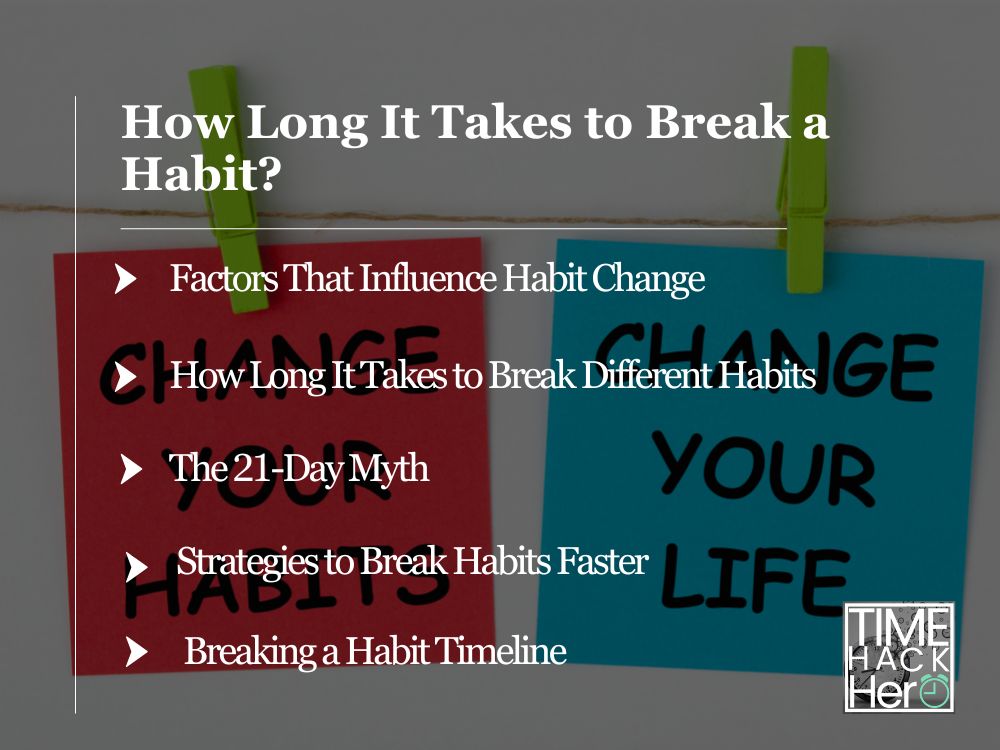Forming a new habit or breaking an old one is no easy feat. It requires willpower, discipline, and consistency. On average, it takes anywhere from 18 to 254 days to form a new habit. But how long does it actually take to break a habit? Let’s take a closer look.
Table of Contents
Factors That Influence Habit Change
There are several key factors that determine how long it takes to break a habit:
Type of Habit
Some habits are easier to break than others. Simple habits like biting your nails take less time to break than more complex habits like smoking or emotional eating.
Habit Strength
The stronger the habit, the longer it will likely take to break. A habit you’ve had for 20 years will be harder to break than one you’ve had for 2 months.
Willpower
Your own self-discipline and willpower have a major impact on habit change. Higher willpower makes it easier to resist temptation and stick to new behaviors.
Reinforcement
Habits that are reinforced or rewarded are harder to break. If you get a boost of dopamine every time you check social media, you’ll have a tougher time breaking that habit.
Substitutes
It’s easier to break a habit if you have a substitute behavior ready to go. Finding a replacement habit fills the void left by the old habit.
How Long It Takes to Break Different Habits
Now let’s look at the estimated time it takes to break some common habits:
| Habit | Time to Break |
|---|---|
| Biting nails | 10-28 days |
| Smoking | 21-30 days |
| Drinking coffee | 12 days |
| Exercising regularly | 66 days |
| Binge eating | 66 days |
| Insufficient sleep | 20-254 days |
As you can see, simple habits like nail biting may take as little as 10 days to break, while more complex habits like binge eating can take 9 weeks or more. The more engrained the habit, the longer it will take to replace with a new behavior.
The 21-Day Myth
You’ve probably heard that it takes 21 days to form a new habit or break an old one. But research doesn’t actually support this claim.
In 2009, researchers in the European Journal of Social Psychology found the time it takes to form a habit can range dramatically from 18 to 254 days. The average was 66 days to form a new habit.
For easy habits, the 21 day rule can hold true. But for tougher habits like eating better, exercising regularly, or quitting smoking, studies show it can take months before the new behavior becomes automatic.
Don’t get discouraged if kicking an old habit is taking longer than 21 days. Habit change happens gradually. Stay focused on your goal, stick to your new routine, and the change will come.
Strategies to Break Habits Faster
While changing habits takes time and commitment, there are strategies you can use to speed up the habit breaking process:
Start Small
Don’t try to change too much at once. Starting with just one or two habit changes is more sustainable. Once those stick, you can add another small change.
Avoid Triggers
Identify what triggers your habit, like boredom, stress, or certain cues. Then avoid those triggers or have a plan to manage them.
Use Reminders
Post reminders around your home or office to reinforce the new habits you want to cultivate. You can also set phone alarms for reminders.
Track Progress
Monitoring your progress daily on a calendar can keep you motivated and on track. Visual evidence of progress helps anchor the new behavior.
Reward Yourself
Celebrate meeting habit change milestones by treating yourself to something special (not food related if it’s an eating habit). Positive reinforcement keeps you going.
Involve Others
Enlist friends or family members to support your habit change goals. Social support improves the likelihood you’ll stick to the new routine.
Be Patient
Remember that slipping up occasionally is normal. Streaks, not perfection, is what counts. Persistence and patience are key.
Breaking a Habit Timeline
To give you a better idea of the full habit breaking timeline, let’s look at the journey step-by-step:
Week 1
The first week is when you decide to start breaking the habit and make a plan. Pick a reasonable start date. Tell people about your goal for support. Identify your habit triggers and strategies for managing them. Stock up on tools and supplies you may need.
Week 2
The second week is when you put your plan into action. Start following the new habit routine and consciously avoid engaging in the old habit. Distractions and friction are common as you establish new patterns. Don’t get discouraged. Stay focused on the reasons you want to change.
Week 3
By the third week, the new routine starts to feel more familiar. But the old habit will still tempt you, so vigilant self-monitoring is needed. The two habits now compete. look out for cues or triggers that make you automatically revert to the old habit.
Week 4
Around the fourth week, the new habit may feel more automatic. But you still need to stay disciplined. By now you’ve hopefully noticed some benefits from the new routine, which keeps you motivated. But regression is common around this stage. Be diligent with self-monitoring and support systems.
Week 5-8
During weeks 5-8, you work to solidify the new habit. By actively choosing and reinforcing the new behavior for 2 months, it starts to take hold. You may find yourself doing it without much conscious thought or effort. Avoid complacency though. Consistency and diligence is still needed.
2-4 Months
Research shows it takes an average of 66 days for a new behavior to become automatic. Some habits take up to 8 months before the change fully sticks. The more complex the habit, the longer it will likely take to feel second nature and break free from the old pattern. But stay focused on your goal.
6 Months
Around 6 months, your new habit now feels like your default behavior while the old habit fades. But you still want to remain vigilant with self-monitoring and not take the change for granted. Don’t be surprised if you experience occasional resurgences of the old habit with stress or life changes. Just refocus and get back on track.
9-12 Months
After 9-12 months of consistency, you can safely say your old habit is likely broken for good and you’ve successfully created a new habitual behavior. But resisting temptation never ends. Even long-time smokers sometimes still get urges. Keep up healthy routines and continue rewarding positive progress.
Frequently Asked Questions
How long does it take to break a bad habit?
On average, it takes between 2 and 8 months of consistent practice to break a bad habit. But simple habits may take only weeks, while lifelong habits can take years to fully break. The key is persistence.
What is the 21-day rule?
The 21-day rule claims it takes 21 days to form or break a habit. But studies show habit formation takes at least 2 months for most people. For difficult habits, it can take up to 8 months of daily repetition. Don’t expect overnight results.
Why is it so hard to break habits?
Habits form strong neural pathways in the brain that make you perform actions automatically without thinking. Breaking habits is hard because you have to disrupt those automatic pathways and consciously form new ones through daily practice over an extended period.
How can you speed up habit change?
Strategies to help you break habits faster include starting small, avoiding triggers, tracking progress, involving others for support, rewarding milestones, and most importantly – being patient with yourself through the ups and downs.
Can you ever fully break an old habit?
It is possible to fully break a habit with consistent practice over time. But even well-broken habits can come back during times of stress or change. Staying vigilant with healthy routines keeps old habits at bay for good. Don’t become overconfident or complacent.
The Bottom Line
Breaking deeply ingrained habits takes patience, diligence, and sustained effort. There is no quick fix. Be realistic with your timeline, stick to the new routine, and celebrate small wins and milestones along the way. With commitment and self-compassion, you can break old patterns and form healthy new habits that last. Consistency is key.









